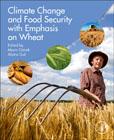
Climate Change and Food Security With Emphasis on Wheat is the first book to present the full scope of research in wheat improvement, revealing the correlations to global issues including climate change and global warming which contribute to food security issues. Wheat holds a key position in the global economy. Due to the continuous increase in population, urbanization and economic modernization of the masses as a result of rising incomes, the requirements for wheat are on the rise. Wheat production will have to increase dramatically to ensure reliable wheat supplies and food security. The increase in wheat production will have to be obtained through either planting more area to wheat or through increase in per unit area production. The scope of former strategy is limited as there is not only little extra land available but is also under pressure and is being lost to construction of new residential areas, community facilities and industrial units. Future wheat requirement must, therefore, come from increasing average yield/ha through developing wheat varieties with high genetic potential, stable yields and resistance/tolerance to the prevalent stresses. Climate Change and Food Security with Emphasis on Wheat facilitates wheat research by providing means to address biophysical and socio-economic constraints including production of high yielding, disease resistant, broadly adapted and good quality wheat varieties to increase and stabilize wheat production world-wide. Written by an international team of experts, this book looks at the abiotic stresses that impact production and the various means of ameliorating those factors. This book is appropriate for advanced students and researchers focused on wheat and other grain improvements to increase yield and address food security. Covers a wide range of disciplines including plant breeding, genetics, agronomy, physiology, pathology, quantitative genetics and genomics, biotechnology, and gene editingExplores the effect of climate change on biotic stresses (stripe rust, stem rust, leaf rust, Karnal bunt, spot blotch) on wheat production and utilization of biotechnologyFocuses on the whole genome sequencing and next-generation sequencing technologies to improve wheat quality and address the issue of malnutrition in developing world INDICE: 1. Genes controlling salinity tolerance in wheat 2. Cellular mechanism of salinity tolerance in wheat 3. Role of osmoprotectants in salinity tolerance in wheat 4. Transcription factors; important players in salinity tolerance 5. Cellular mechanism of drought tolerance in wheat 6. Molecular mechanism of drought tolerance in wheat 7. Role of osmoprotectants in drought tolerance in wheat 8. LEA proteins and drought stress in wheat 9. Drought responsive ESTs in wheat 10. Role of transcription factors in drought mediating pathways in wheat 11. Spot blotch in wheat 12. Next generation sequencing in bread wheat 13. Landraces; widening the narrow gene pool of wheat 14. Kamal bunt in wheat 15. Digital imaging 16. Genomic selection in wheat 17. Quantitative genomics in wheat
- ISBN: 978-0-12-819527-7
- Editorial: Academic Press
- Encuadernacion: Rústica
- Páginas: 384
- Fecha Publicación: 15/04/2020
- Nº Volúmenes: 1
- Idioma: Inglés
